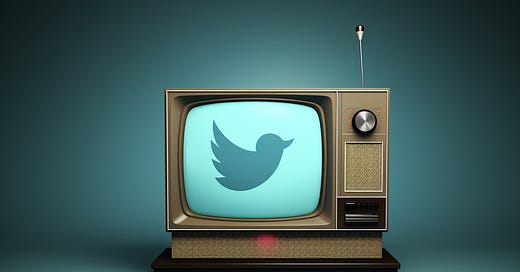Elon Musk Turned Twitter Into the Cable Company
And Twitter users are cutting the cord for Threads.
1. Fork the Users
On Wednesday night Facebook Meta launched “Threads,” its Twitter clone. Within a few hours Threads had 10 million users. Within 18 hours the app was up to 30 million users. Depending on whom you believe, Threads may be close to 70 million users by the time you read this.
Twitter launched in 2006 and today has 300 million users.
So it is not an exaggeration to say that Threads is a dagger aimed at the heart of Twitter. I’ll go further: It is difficult for me to see how Twitter survives as a going concern.
How does a business collapse like this happen? Why would tens of millions of users flee one free social platform for another, nearly identical, free social platform?
It’s because Elon Musk turned Twitter into a company that hated most of its users. He believed that his moat was so wide and deep that he could afford to treat them with disdain.
Musk turned Twitter into the cable company.
For decades the cable company was the most despised business class in the country. You wanted cable TV? Great. Your local cable company had you over a barrel. Service would come and go. Technicians would show up late, or not at all. The seventh circle of Hell was phone support with Cablevision, or Comcast, or Spectrum, or whomever.
It was clear from the way the cable companies operated that they viewed their customers as whiny cost centers to be ignored, shunned, or minimized. Cable companies could do this because the customers had no options. You want to stick with the rabbit ears? Or get a satellite dish the size of the Death Star? Go for it. Otherwise you’re going to keep paying the cable company, no matter how much you hate it.
Which is why, when over-the-top streaming services were born, people fled cable at such a fantastic rate that it became the subject of b-school studies the world over.
The cable companies were shocked. Who did these people think they were! After spending nearly a decade sputtering in disbelief, cable tried to pivot and compete for customers, but it didn’t work.
The numbers on cable’s decline are absolutely brutal.
That’s right: Today more households don’t have cable than have it.
Prior to Elon Musk’s purchase, Twitter was not great at serving users, but its failures were mostly the result of resource problems. The platform was always held together with chewing gum and duct tape and products shipped at glacial rates. But as an institution, Twitter did not go out of its way to actively alienate whole classes of users.
Musk changed that.






